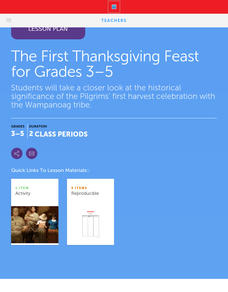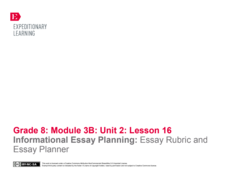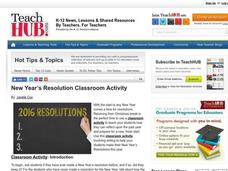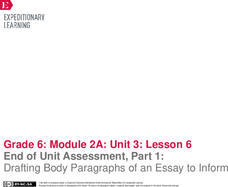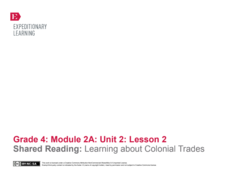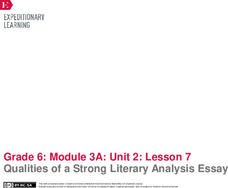Scholastic
Step-by-Step Strategies for Teaching Expository Writing
A carefully crafted, logically organized, 128-page packet is an excellent addition to your unit on expository writing.
K20 LEARN
Introduction to Expository Writing
Move beyond the five-paragraph essay with a lesson introducing young writers to various forms of expository writing. Class members examine description, cause and effect, problem solution, sequence, and comparison forms. They create an...
Anti-Defamation League
Lonnie Chavis of 'This Is Us' Writes about Racism
Scholars read and discuss an essay by 12-year-old actor Lonnie Chaves about racism, paying close attention to how racism presents itself in interpersonal and institutional ways. Learners reflect on how they experience or witness racism...
Overcoming Obstacles
Writing Reports
Following a review of how to research and take notes, scholars define the term paraphrase and identify ways to organize information and finish reports. To put their newfound knowledge to the test, learners interview a peer, take notes,...
EngageNY
Scaffolding for Essay: Examining a Model and Introducing the NYS Grade 6–8 Expository Writing Evaluation Rubric
Write it down. Scholars take a close look at essay writing by examining the New York state writing rubric. They then discuss a model essay and compare the model essay to the What Makes a Literary Analysis Essay Effective? Anchor Chart....
Nancy Fetzer's Literacy Connections
Expository Paragraph
Upper elementary and middle school writers learn how to craft an expository paragraph by following the six steps detailed in a 48-page instructional guide. Learners learn how to write six different types of informational paragraphs: to...
EngageNY
Performance Task Preparation: Peer Critique and Mini-Lesson Addressing Common Errors: Revising Draft Essay to Inform
Time to revise! Using a writing evaluation rubric, scholars participate in a peer editing process to provide feedback on each others' informative essays. Next, pupils begin revising their drafts based on the feedback they receive.
EngageNY
Planning for Writing: Introduction and Conclusion of a Literary Analysis Essay
First and last impressions are important. Using the helpful resource, scholars draft the introductory and concluding paragraphs of their literary analysis essays. Next, they use a writing evaluation rubric to self-assess their work.
Scholastic
The First Thanksgiving Feast for Grades 3-5
Scholars examine the first Thanksgiving through books and interviews while they complete a KWL chart. Pretending they are part of the feast, learners craft a scrapbook page that features images related to their experience. Pupils reflect...
EngageNY
Revising the Informative Consumer Guide: Sentence Structure, Transitions, and Works Cited
Transitions are the glue that link paragraphs together. Pupils listen to a mini lesson plan on sentence structure and transitions and use what they learned to revise their informative consumer guides. Next, they self-assess their writing...
K20 LEARN
Writing An Argumentative Paragraph: Argumentative Writing
Learning how to craft a cogent argument based on a solid claim, supported with evidence and solid reasoning, is an important life skill. Teach middle schoolers about argumentative writing with a lesson asking them to analyze the claims,...
EngageNY
Informational Essay Planning: Essay Rubric and Essay Planner
Class members dig into the expectations for the end-of-unit assessment for A Mighty Long Way by studying the rubric. The Rubric Criteria strips help pairs of readers look more closely at specific rubric points. They share ideas with the...
Dream of a Nation
Writing an Analytic Essay
After researching an issue introduced in Tyson Miller's Dream of a Nation: Inspiring Ideas for a Better America, writers develop an original thesis statement and craft an analytic essay using evidence collected in their research.
Dream of a Nation
Writing Interdisciplinary Essay
The Grapes of Wrath. The Jungle. Native Son. The Things They Carried. The Absolutely True Diary of a Part Time Indian. To address a current social, political, economic, or environmental issue, class groups pair the reading of a classic...
EngageNY
End of Unit 2 Assessment, Part Two: Final Draft of Analytical Essay
What's one way to make a good essay great? Revise! Scholars revise their drafts from a previous lesson plan to help write their final polished analytical essays about the universal refugee experience. They also practice properly citing...
EngageNY
Close Reading: Paragraphs 2 and 3 of “Refugee and Immigrant Children: A Comparison” and Introducing the NYS Expository Writing Rubric
What factors make adaptation successful for refugee and immigrant children? The class explores the topic by reading two paragraphs from "Refugee and Immigrant Children: A Comparison." Next, they engage in a think-pair-share to discuss...
K20 LEARN
Let Us Start The Lettuce Club (Or Not): Writing A Thesis Statement
Let us be frank! Writers learn that crafting a thesis statement is not that difficult if one peals back the layers. After watching several videos about the elements of a thesis, class members read the article "Lettuce Club helps students...
Teach Hub
New Year’s Resolution Classroom Activity
Create a sense of accountability among scholars with a lesson that focuses on making and keeping New Year's resolutions. Writers compose a five paragraph essay focused on three resolutions—promises to self improvement, to their family,...
EngageNY
End of Unit Assessment, Part 1: Drafting Body Paragraphs of an Essay to Inform
Anybody can write a body paragraph! Pupils analyze the development of ideas in a body paragraph from a model essay. Next, using what they've learned, they draft the body paragraphs of their My Rule to Live By informative essay.
Learning to Give
Create a Volunteer Spirit
Motivate young citizens to make a positive difference through volunteering. Scholars examine the local and school community to discover ways the class, as a whole, can volunteer their time to help one or the other, then reflect on their...
EngageNY
Shared Reading: Learning About Colonial Trades
Trading in Colonial America is the focus of a lesson plan that boosts reading skills. As a class, scholars examine the informational text for crucial details, use their newfound knowledge to share information with their peers, and write...
EngageNY
Informational Essay Planning: Analyzing and Selecting Evidence
Class members look again at the end-of-unit essay prompt for A Mighty Long Way. After reviewing the requirements of the essay, they use their Gathering Evidence note-catchers and color-code the evidence that matches the two questions in...
EngageNY
Qualities of a Strong Literary Analysis Essay
Read like a writer. Scholars read a model literary analysis in preparation for a similar writing assignment before annotating each paragraph for the gist. Next, pupils devise a list of qualities of a strong literary analysis essay.
EngageNY
Determining Cascading Consequences Using The Omnivore’s Dilemma: Hunter-Gatherer Food Chain
Focusing on the consequences of the hunter-gatherer food chain that Michael Pollan discusses in The Omnivore's Dilemma, teams work together to create hunter-gatherer food chain consequences charts. Next, scholars view other groups'...
Other popular searches
- Expository Writing Prompts
- Expository Writing Template
- Expository Writing Lessons
- Expository Writing Exercises
- How to Expository Writing
- Voice in Expository Writing
- Expository Writing Rubrics
- Expository Writing Exemplars
- Expository Writing Peer Edit
- Writing Expository Essays
- Writing Expository
- Writing Expository Paragraph










